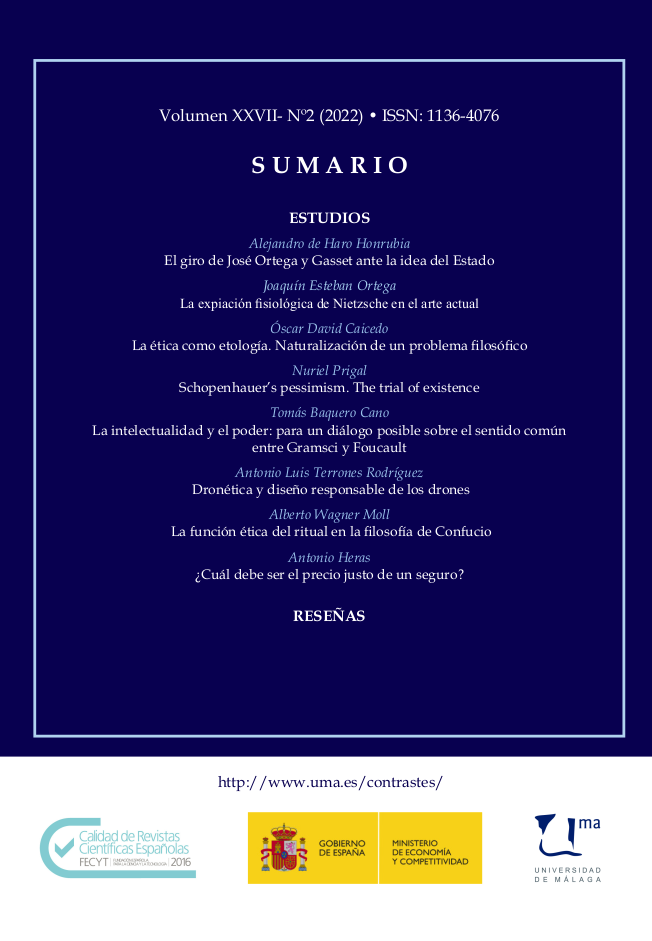Schopenhauer's Pessimism: The Trial of Existence
DOI:
https://doi.org/10.24310/Contrastescontrastes.v27i2.12510Keywords:
Metaphysics, The Will, Suffering, Justification, Philosophy of LifeAbstract
I attempt to present a more holistic and more detailed account of Schopenhauer's pessimistic philosophical premises and their implications. The discussion begins with Schopenhauer's claim that the world is representation and with the discovering of the Will. It continues by examining the implications of the Will, which leads to the argument against existence itself.
Downloads
Metrics
References
ATWELL. J. E. (1990), Schopenhauer: The Human Character, Philadelphia: Temple University Press.
ATWELL, J. E. (1995), Schopenhauer on the character of the world: The Metaphysics of Will, University of California Press.
BERGSON H. (2001), Time and Free will, an Essay in The Immediate of Consciousness, Translated by F. L. Pogson. United States: Dover Publications, Inc.
BERKELEY G. (1996), Principles of Human Knowledge and three dialogues, New York: Oxford University Press.
BERGER. D.L. (2004), «The Veil of Maya»: Schopenhauer’s system and early Indian thought, New York: Global Academic Publishing, Binghamton.
GARDINER. P. (1997), Schopenhauer, Dulls, Virginia: Thoemmes Press.
HAMLYN, D. W. (1980), Schopenhauer, London: Routledge & Kegan Paul.
HUME D. (2007), Dialogues Concerning Natural Religion: And Other Writings, New York, Cambridge University Press.
JACQUETTE. D. (2005), The Philosophy of Schopenhauer, Ithaca: McGill-Queen’s University Press, Montreal & Kingston.
JANAWAY. C. (1994), Schopenhauer: A very short introduction, Ney York: Oxford University Press.
JANAWAY. C. (1989), Self and World in Schopenhauer’s Philosophy, New York:Clarendon Press Oxford.
JORDAN. N. (2009’) Schopenhauer’s Ethics of Patience: virtue, salvation, and value, New York: The Edwin Mellen Press.
LAUXTERMANN P. (2000) Schopenhauer’s Broken World-View: Colours and Ethics between Kant and Goethe, Dordrecht: Springer-Science+Business Media Dordrecht.
MAGEE B. (1983), The Philosophy of Schopenhauer, New York: Oxford University Press.
NEELEY, S.G. (2004), Schopenhauer: A Consistent Reading, Lewiston, N.Y.: Edwin Mellen Press.
SCHOPENHAUER A. (2019), Die Welt als Wille und Vorstellung: Gesamtausgabe (German Edition), epubli; first edition.
SCHOPENHAUER A. (1974), On the Fourfold Root of the Principle of Sufficient Reason, Translated by E. F. J. Payne. USA: Open Court Publishing.
SCHOPENHAUER A. (1974), Parerga and Paralipomena, Volume 2, Translated by E. F. J. Payne. New York: Oxford University Press.
SCHOPENHAUER A. (1966), The World as Will and Representation, Volume 1, Translated by E. F. J. Payne. New York: Dover Publication Inc.
SCHOPENHAUER A. (1966), The World as Will and Representation, Volume 2, Translated by E. F. J. Payne. New York: Dover Publication Inc.
SCHOPENHAUER A. (2010), The Two Fundamental Problems of Ethics, Translated by D. E. Cartwright & E. E. Erdmann. New York: Oxford University Press.
WICKS, R. (2008), Schopenhauer, Oxford: Blackwell.
WICKS R. (2011), Schopenhauer’s The World as Will and Representation: A Reader’s Guide, London: Continuum.
YOUNG. J. (2005), Schopenhauer, Severin Schroeder, New York: Routledge.
VANDENABEELE B. (2011), «Schopenhauer on Sense Perception and Aesthetic Cognition», The Journal of Aesthetic Education, Vol. 45, No. 1, pp. 37-57.
WITTGENSTEIN L. (2002), Tractatus Logico-Philosophicus, translated by D. F. Pears & B. F. McGuiness. London: Routledge, Taylor & Francis e-Library.
Downloads
Published
How to Cite
Issue
Section
License
This journal provides immediate free access to its content under the principle of making research freely available to the public. All content published in Contrastes. Revista Internacional de Filosofía, are subject to the Creative Commons Attribution-NonCommercial-ShareAlike 4.0 license whose full text can be found at <http://creativecommons.org/licenses/by-nc-sa/4.0>
It is the responsibility of the authors to obtain the necessary permissions of the images that are subject to copyright.
Authors whose contributions are accepted for publication in this journal will retain the non-exclusive right to use their contributions for academic, research and educational purposes, including self-archiving or repository in open access repositories of any kind.
The electronic edition of this magazine is edited by the Editorial Service of the University of Malaga (Uma Editorial), being necessary to cite the origin in any partial or total reproduction.









5.png)
